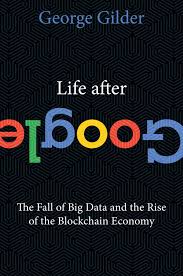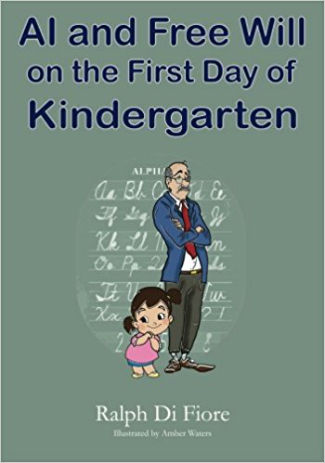Artificial Intelligence: A Mirage?

“Life after Google” is a new book by conservative economist George Gilder in which he discusses the monopoly which Google has been exercising over search engine technology these past 15-20 years.
Book reviewer Arthur Herman analyzes Gilder’s claim that “Google’s algorithms determine what content we will like and not like based on innumerable layers of data collected in the past, and then its search engine serves it up, giving us the illusion that we are freely choosing something.” Google, says Herman’s analysis via Gilder, is “a monopoly disguised as a middle man.”
Inevitable Google’s successes tempted hackers and break-in artists to help create a cloud of suspicion it has been under this past year. Security has always taken a back seat at Google, claims Gilder, and the rise of such features as quantum computing is challenging the Google stranglehold.
“The Artificial Intelligence Hysteria”
What is intriguing about Gilder’s book, however, is the way he seems to debunk the rise of Artificial Intelligence (AI) which has garnered much attention these past decades. Dan Brown built on this in his latest novel, Origin, in which AI is portrayed as a possible nefarious influence – (spoiler alert) the villain in Browns latest scenario is the computer called “Winston”, an echo of “HAL” from the movie “2001: A Space Odyssey.”
Gilder references the “hysteria” generated when such luminaries as Elon Musk and Stephen Hawking warned against the possibilities of AI overtaking and replacing humanity. Herman, however, argues that AI and “machine learning” is flawed at the core: it is mainly about computation, about processing data faster, not about learning, let alone thinking in any meaningful sense. “AII will always be useless without a human programmer and operator – who will always have the ultimate advantage of the human brain.”
 Professor Ralph Difiore
Professor Ralph DifioreReaders of this website will remember an intriguing exploration of AI advanced here a year ago by Professor Ralph Difiore, principal of a college in Toronto, Canada, who rebutted the AI fixation in a recent book. Those of a more technical mind-set may appreciate his arguments. Difiore’s perspective is guided by the views of John Von Neumann who in turn built on the insights of the brilliant 1930s mathematician Kurt Gödel, who showed that even mathematics – as powerful as it is – has its own built in limitations.
Here are direct quotes from Professor Difiore.
“In short, Gödel’s theorems demonstrated in an iron-clad and rigorous methodology to show that formal attempts to capture mathematical finality are doomed to failure (as, for example, with the problem of real numbers). The mathematical landscape is strewn with truths that cannot be ‘captured’ and are paradoxical in nature. They have to start with assumptions and the inability of a formal system to capture them does in no way negate that they are mathematically true. This strikes at and cautions against an overwhelming certitude that the mathematical world wanted.
“Sadly, the philosophical implications of Gödel’s incompleteness theorems were ignored or not grasped. The 20th century ushered in a wave of atheism in many scientific circles. Many felt they had shed the shackles of religion and were now free rationalists who could solve and explain all phenomena in purely rational ways.
“The peerless intellectual giant John Von Newman, however, pointed out significances that even Gödel himself did not see.

Mind over Machine
“Von Neumann believed the mind is uniformly better formed than the purported mechanist representation of it but it operates in a very different manner. Gödel’s theorems had effectively refuted any future mechanistic thesis of the mind. How so? Envision the following scenario: a mechanist formulates a particular mechanistic thesis by claiming, for example, that the human mind is a Turing machine (an early computer) with a given formal specification. This machine produces Gödel’s ‘S’ sentence, which we can see is true, but the Turing machine cannot. Then, a mechanist puts forth a different thesis by claiming, for example, that the human mind is a Turing machine with formal specification ‘S’.
“The ‘S’sentence model shows that a sentence independent of a proven theory will have models in which the sentence is true and models in which it may not be true, e.g. the statement ‘grass is green.’ Sometimes, as we know, grass turns brown. The computer cannot get beyond this whereas the human mind can see other possibilities. The logical conclusion is that the widely influential Computational Theory of Mind is false. The human mind can see in which model the sentence is true and in which model the sentence is false. Likewise, the strong hope for artificial intelligence in our time is false; it is impossible to construct a machine that can perfectly imitate the total of our cognitive abilities.
“One can see why Gödel encountered so much criticism and resistance. What he was indirectly supporting was none other than the age old religious belief in a non-material component animating us as human beings. Materialists would love to believe that our minds are mere computational devices that can be replicated with complex algorithms. They are bothered by something non-material animating humans. Their best attempt at a solution, an explanation, is to take only one component of the human mind, computation, and make that the basis for the complete explanation to the human mind.
“Many are seeing that this conclusion is false and improvable. The true conclusion one should draw from Gödel’s stunningly brilliant theorems is that the human mind is far greater than any computational machine and that it transcends our material world and indeed rightly belongs to the domain of the transcendent. That is an awesome and inspiring conclusion that should give us great comfort in the daily lives of those who reach out to an invisible God (Hebrews 11:27).”
Professor Difiore has an enjoyable entry-level book on this subject titled “AI and Free Will.” In the end he agrees with Gilder’s thesis that a machine “is part of a deterministic order,” i.e. its confines are set by the human operator. Thus, “lacking surprise or the ability to be surprised, it is self-contained and determined.” This follows from Gilder’s reminder of the power of human imagination and intuition, “Consciousness depends on faith – the ability to act without full knowledge and the ability to be surprised.”
Science depends on faith and intuition to unravel the “happy accidents” that can occur in creation. Consider, for example, Alexander Fleming discovering the rudiments of penicillin from mould left haphazardly in a Petri dish. We can extend this point by remembering Newton’s apple, Watt’s steam kettle or Einstein’s’ “thought experiments.”
Bettering HAL and “Winston”
Centuries ago the Biblical writer Paul of Tarsus wrote that the created order we see about us is the product of invisible, transcendent forces (Hebrews 11:3), forces at work in the cosmos and also in the human mind. That non-material substance is sometimes called “the ghost in the machine.” It is that “ghost” that accounts for the phenomenal creative output of the human species. Religious folk sometimes call this “God” and the more we learn about the limitations of our machine-based culture the more we can be thankful that the future does not rest with Artificial Intelligence.
Search as we can we are still at a mystery to probe the ultimate depths and dimensions of the human subject. The words of the Hebrew sages 2500 years ago still ring true:
“But where can wisdom be found? Where does understanding dwell? The deep says, It is not in me,’ the sea says ‘It is not with me.” It cannot be bought with the finest gold, nor can its price be weighed in silver…Where then does wisdom come from? Where does understanding dwell? It is hidden from the eyes of every living thing…God understands the way to it and he alone knows where it dwells…” (Job 27:12-23).
Best of all, this Great God says he can offer it to every one of us who ask in sincerity and faith (James 1:5).
(Ralph Difiore is happy to engage questions over his e-mail at rdifiore@royalcrowncollege.com.)